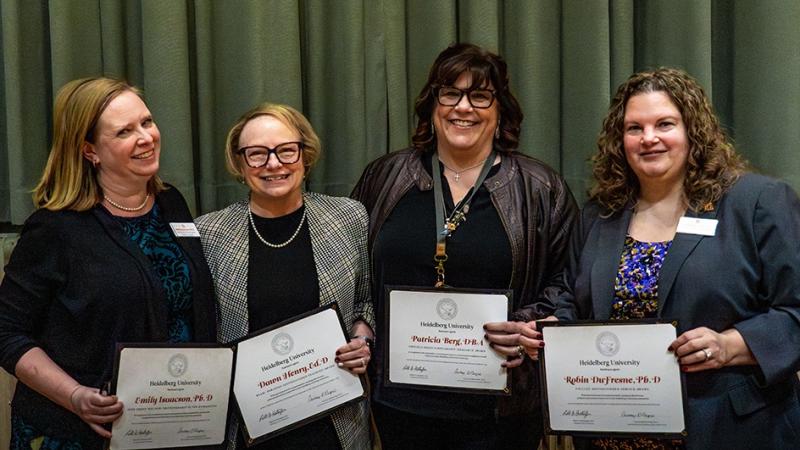HYPE speaker: Toward smart money goal$
Stacey Tisdale is not just an award-winning financial journalist. She’s a financial behavioral expert and the president and CEO of Mind Money Media Inc. Tisdale also holds the titles of being the first African American and one of the first women to report from the New York Stock Exchange.
On Tuesday, she took the stage at Heidelberg as the keynote speaker for the HYPE Career Ready® program.
As a financial journalist for some of the largest media organizations in the world, she has had a front-row seat to “see how money interacts and dances in our lives.” It was from that vantage point that she began to consider what it is about money that “we can’t seem to get our finances right.”
The driver of financial behavior
For six years, Tisdale studied what drives people’s financial behavior after understanding that money is often the source of so much stress and unhappiness. The reality, she said, is that “few things work simpler than money.”
Luckily for Tisdale, she was already in the heart of where she needed to be to conduct her research – in constant contact with experts from financial advisors to psychologists. In her research, Tisdale came to find that a lot of this misunderstanding stemmed from conditioning about money.
“The real dance in financial wellness becomes learning how to manage conditioning,” she said. “Learning how to know the difference between who you are and what the world is telling you.”
She also observed the generational differences and believes millennials and Gen Z have it right.
“You got handed a load of crap with the economy you stepped into,” she told the students. “But what you’re giving back is a sharing economy.”
Gen Z breaking down $$ stereotypes
Tisdale praised the way Gen Z has pushed aside the financial conditioning ideology and continues to pave a path of their own. Yet, COVID and technology have brought a lot of changes with regard to what we value regarding work and money as well as changed gender and race norms.
“The capitalist model dies with your generation,” she said. It’s being replaced with a more inclusive and diverse digital model, in both gender and racial norms.
“It’s just mind-boggling to me that you guys are dropping gender identification and dissolving gender norms and how many of those problems are going to dissolve with your generation. It’s incredible.
“You’re a very individualistic bunch. There’s so much we can learn from you.”
The space between knowledge, behavior: managing debt
There are three forces – “money scripts” – at play with financial behavior: childhood scripts based on conditioning about money growing up, social scripts based on race, gender and other norms, and the songs we play in our head, defined as repeated messages from others that are often false, Tisdale explained.
“One of the biggest scripts is that student loan debt is going to define my life,” she said. Debt, which comes in many forms, can have a negative stigma and can lead to mental health and medical issues, but it should not be an indicator of self-worth.
Because debt affects the way we think, it’s important to understand how to deal with debt-related stress, Tisdale said. She offered these points: Be present, be positive, be honest, do self-care, get support and make a plan.
She also noted that there are solutions available for student loan debt; you just have to know where to find them.
Aligning financial choices with values
“When you realign your financial choices and behavior to what’s really important to you, it’s a lot easier to manage,” she told the students. Goals, she added, “are greater than those ‘money scripts.’”
To have a more positive outlook about money, it takes rewiring how our brain; a new set of possibilities can lead to different decisions and outcomes.
“Financial planning begins here,” she said. “If you really identify your goals, you’ll have a lot of oomph to stand up to that scripting and see that it’s an illusion.”
Toward smart money goal$
Smart money goal$ should be specific, measurable, attainable, relatable and timely. She recommended creating a plan that addresses these questions:
• What do your goals cost?
• Allocate for emergencies
• Know your assets
• Know what you spend
• Identify resources
“This is not a dress rehearsal. This is your life. Right now.”
Tisdale concluded her presentation with this uplifting advice for students: “You are the most equipped generation in history to succeed at this. Stay close to your experiences and trust yourselves. Not only were you born into this but you’re leading us into a new era.”




